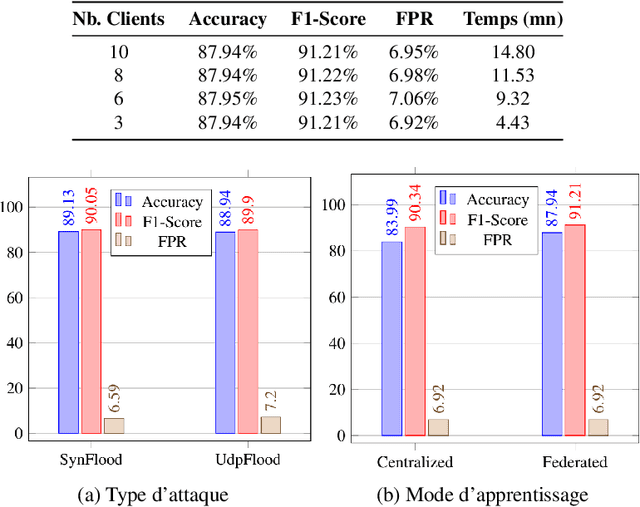Rabah Rahal
Fuse and Federate: Enhancing EV Charging Station Security with Multimodal Fusion and Federated Learning
Jun 07, 2025Abstract:The rapid global adoption of electric vehicles (EVs) has established electric vehicle supply equipment (EVSE) as a critical component of smart grid infrastructure. While essential for ensuring reliable energy delivery and accessibility, EVSE systems face significant cybersecurity challenges, including network reconnaissance, backdoor intrusions, and distributed denial-of-service (DDoS) attacks. These emerging threats, driven by the interconnected and autonomous nature of EVSE, require innovative and adaptive security mechanisms that go beyond traditional intrusion detection systems (IDS). Existing approaches, whether network-based or host-based, often fail to detect sophisticated and targeted attacks specifically crafted to exploit new vulnerabilities in EVSE infrastructure. This paper proposes a novel intrusion detection framework that leverages multimodal data sources, including network traffic and kernel events, to identify complex attack patterns. The framework employs a distributed learning approach, enabling collaborative intelligence across EVSE stations while preserving data privacy through federated learning. Experimental results demonstrate that the proposed framework outperforms existing solutions, achieving a detection rate above 98% and a precision rate exceeding 97% in decentralized environments. This solution addresses the evolving challenges of EVSE security, offering a scalable and privacypreserving response to advanced cyber threats
Federated Learning for Zero-Day Attack Detection in 5G and Beyond V2X Networks
Jul 03, 2024
Abstract:Deploying Connected and Automated Vehicles (CAVs) on top of 5G and Beyond networks (5GB) makes them vulnerable to increasing vectors of security and privacy attacks. In this context, a wide range of advanced machine/deep learning based solutions have been designed to accurately detect security attacks. Specifically, supervised learning techniques have been widely applied to train attack detection models. However, the main limitation of such solutions is their inability to detect attacks different from those seen during the training phase, or new attacks, also called zero-day attacks. Moreover, training the detection model requires significant data collection and labeling, which increases the communication overhead, and raises privacy concerns. To address the aforementioned limits, we propose in this paper a novel detection mechanism that leverages the ability of the deep auto-encoder method to detect attacks relying only on the benign network traffic pattern. Using federated learning, the proposed intrusion detection system can be trained with large and diverse benign network traffic, while preserving the CAVs privacy, and minimizing the communication overhead. The in-depth experiment on a recent network traffic dataset shows that the proposed system achieved a high detection rate while minimizing the false positive rate, and the detection delay.
AntibotV: A Multilevel Behaviour-based Framework for Botnets Detection in Vehicular Networks
Jul 03, 2024Abstract:Connected cars offer safety and efficiency for both individuals and fleets of private vehicles and public transportation companies. However, equipping vehicles with information and communication technologies raises privacy and security concerns, which significantly threaten the user's data and life. Using bot malware, a hacker may compromise a vehicle and control it remotely, for instance, he can disable breaks or start the engine remotely. In this paper, besides in-vehicle attacks existing in the literature, we consider new zeroday bot malware attacks specific to the vehicular context, WSMP-Flood, and Geo-WSMP Flood. Then, we propose AntibotV, a multilevel behaviour-based framework for vehicular botnets detection in vehicular networks. The proposed framework combines two main modules for attack detection, the first one monitors the vehicle's activity at the network level, whereas the second one monitors the in-vehicle activity. The two intrusion detection modules have been trained on a historical network and in-vehicle communication using decision tree algorithms. The experimental results showed that the proposed framework outperforms existing solutions, it achieves a detection rate higher than 97% and a false positive rate lower than 0.14%.
 Add to Chrome
Add to Chrome Add to Firefox
Add to Firefox Add to Edge
Add to Edge